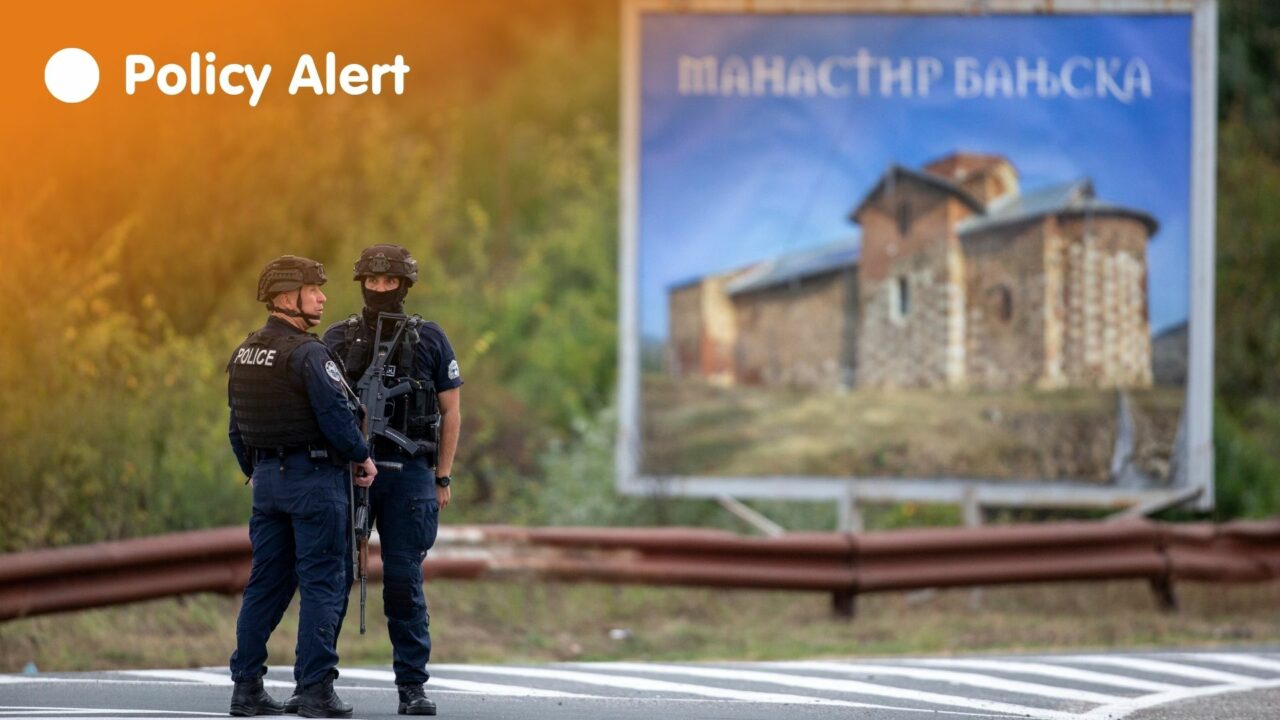Violence in North Kosovo: How the EU and the US can break the cycle
When a heavily armed group of 30 masked individuals attacked police in the north of Kosovo on Sunday, killing one police officer and wounding another, it should have come as no surprise. It is the latest in a series of similar violent acts by Serbian armed criminal gangs, which have gradually grown in scope and intensity.
Violent incidents in the north have undermined the already difficult dialogue process between Serbia and Kosovo over the last year. Serbia’s president Aleksandar Vucic has used the violence to challenge Kosovo’s authority in the north and push for the autonomy of the four northern municipalities, which would allow Serbia to interfere in Kosovo’s domestic affairs through its proxies.
Accordingly, Vucic characterised the latest attack as a legitimate act of resistance by local Serbs, which would not have happened if the Association of Serb-majority Municipalities (ASM) – the main stumbling block in the dialogue process – existed. He also called for Serb, rather than Albanian, police forces to take over security operations in the north.
But the type and amount of weapons seized suggest this was a bigger, coordinated combat operation with the aim to destabilise the region.
In the current political and security context, this episode should raise alarm bells. Resolving the dispute between Kosovo and Serbia is no longer just a political matter, but a serious security issue for the region and for Europe.
Peace through strength
To stop this spiralling violence and advance the dialogue process, a new approach is urgently needed:
- The European Union and United States should provide intelligence-gathering support to Kosovo institutions through the EU Rule of Law Mission in Kosovo (EULEX) and the NATO-led international peacekeeping force in Kosovo (KFOR) to identify and prosecute those responsible for organising, funding, and carrying out the attacks. Condemnation alone – their approach after the brutal attacks on KFOR soldiers in May – clearly will not deter further violence.
- Kosovo authorities, the EULEX, and KFOR should carry out a joint security assessment in the north of Kosovo to reassess the security threat and adjust the number of security officials on the ground accordingly.
- KFOR should better secure the border between Kosovo and Serbia (with the Kosovo authorities) and re-establish the ground safety zone on the Serbian side to prevent the influx of weapons and paramilitaries via smuggling routes.
- The EU and US should support an institutional solution between Kosovo and Kosovo Serbs that allows their genuine cultural, educational, and religious self-management, without enabling Belgrade’s interference in Kosovo’s domestic affairs.
Implications for the dialogue
This attack will entrench the positions of Vucic and Kosovo’s prime minister Albin Kurti concerning the ASM. Serbia demands its creation as a precondition for the implementation of the Ohrid agreement. Kosovo considers the implementation of the whole agreement crucial for normalisation.
The incident will also strengthen Kurti’s determination to increase Kosovo’s law enforcement in the north, which requires exercising sovereignty that Serbia adamantly opposes.
For the US and EU, the choice is no longer just between the failure and success of the dialogue but between stability and a further escalation of violence. The latter is most likely unless they finally acknowledge Belgrade’s role in destabilising Kosovo and adopt a robust approach to counter it.
The European Council on Foreign Relations does not take collective positions. ECFR publications only represent the views of their individual authors.



